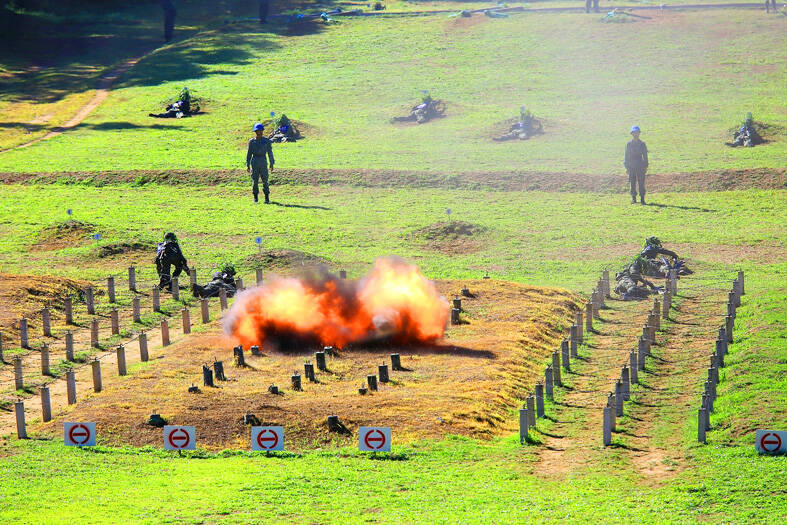The Chungshan Institute of Science and Technology has developed a polycyclic nitroamine explosive, commonly known as CL-20, which is the most powerful non-nuclear explosive known, a government source said yesterday on condition of anonymity.
The institute has significantly improved explosive and rocket propellant research and development in recent years, the source said.
A new factory was established in June 2022 with NT$540 million (US$16.6 million) in equipment installed, the source said.

Photo copied by Chen Wen-chan, Taipei Times
A central complex that would house 50-gallon (189 liters) and 300-gallon (1,136 liters) explosive mixer machines, as well as a storage device, was constructed in the factory, the institute said.
The explosive is 40 percent more powerful than those currently used and could be deployed for Hsiung Feng II (“Brave Wind” II, HF-II) and HF-III missiles, the source said.
The source did not comment on what other type of domestically manufactured missiles would be compatible with the CL-20 compound.
However, the institute has the intellectual property rights to all development and manufacturing of products using CL-20, and may authorize its use and production outside of the institute in favor of growing the national defense industry, the source added.
The US, the EU, China and Russia have also researched and made the compound, but due to its high-technical barrier and manufacturing costs, it has not entered commercial production, the source said.
Despite difficulties in mass production, CL-20 has seen some minor uses within the US and China, and has also been used in the Russia-Ukraine war, the source said.
The institute carries the heavy responsibility of researching and developing explosive compounds for the national defense sector, which has become even more important following the passage of the Sea-Air Combat Power Improvement Plan Purchase Special Regulation (海空戰力生計畫採購特別條例) and the increased production of missiles of all types, the source said.
The research and development of rocket propellants was a significant task, the institute said, adding that it was building a solid foundation for basic production capabilities.
To achieve this, the institute said it has ensured that the compound mixing and propellant research areas are safe, equipped with up-to-date machinery and technology, and are comfortable to work in.
In tandem with domestic companies, the institute has researched and built a 1,136-liter mixer from the ground up, further enhancing the autonomy of Taiwan’s national defense sector.

ACTION PLAN: Taiwan would expand procurement from the US and encourage more companies to invest in the US to deepen bilateral cooperation, Lai said The government would not impose reciprocal tariffs in retaliation against US levies, President William Lai (賴清德) said yesterday, as he announced five strategies to address the issue, including pledging to increase Taiwanese companies’ investments in the US. Lai has in the past few days met with administrative and national security officials, as well as representatives from various industries, to explore countermeasures after US President Donald Trump on Wednesday last week announced a 32 percent duty on Taiwanese imports. In a video released yesterday evening, Lai said that Taiwan would not retaliate against the US with higher tariffs and Taiwanese companies’ commitments to

‘SPECIAL CHANNEL’: Taipei’s most important tasks are to stabilize industries affected by Trump’s trade tariffs and keep negotiations with Washington open, a source said National Security Council Secretary-General Joseph Wu (吳釗燮) arrived in the US for talks with US President Donald Trump’s administration, a source familiar with the matter said on Friday. Wu was leading a delegation for a meeting known as the “special channel,” the Financial Times reported earlier. It marked Trump’s first use of the channel since returning to the White House on Jan. 20. Citing a source familiar with the matter, the Financial Times reported that Minister of Foreign Affairs Lin Chia-lung (林佳龍) was also a part of the delegation. The visit came days after China concluded war games around Taiwan and amid Trump’s

CHIP EXCEPTION: An official said that an exception for Taiwanese semiconductors would have a limited effect, as most are packaged in third nations before being sold The Executive Yuan yesterday decried US President Donald Trump’s 32 percent tariff on Taiwanese goods announced hours earlier as “unfair,” saying it would lodge a representation with Washington. The Cabinet in a statement described the pledged US tariffs, expected to take effect on Wednesday next week, as “deeply unreasonable” and “highly regrettable.” Cabinet spokeswoman Michelle Lee (李慧芝) said that the government would “lodge a solemn representation” with the US Trade Representative and continue negotiating with Washington to “ensure the interests of our nation and industries.” Trump at a news conference in Washington on Wednesday announced a 10 percent baseline tariff on most goods

Intelligence agents have recorded 510,000 instances of “controversial information” being spread online by the Chinese Communist Party (CCP) so far this year, the National Security Bureau (NSB) said in a report yesterday, as it warned of artificial intelligence (AI) being employed to generate destabilizing misinformation. The bureau submitted a written report to the Legislative Yuan in preparation for National Security Bureau Director-General Tsai Ming-yen’s (蔡明彥) appearance before the Foreign Affairs and National Defense Committee today. The CCP has been using cognitive warfare to divide Taiwanese society by commenting on controversial issues such as Taiwan Semiconductor Manufacturing Co’s (TSMC, 台積電) investments in the